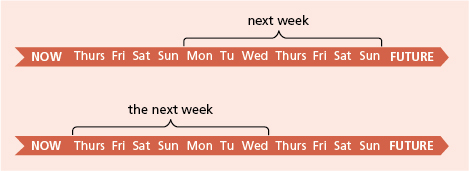next and the next; nearest
next week, month, etc; the next week, month, etc
Next week, month, etc (without the) is the week, month, etc just after this one. If I am speaking in July, next month is August; in 2016, next year is 2017.
The next week, month, etc is the period of seven, thirty, etc days starting at the moment of speaking. On July 15th 2016, the next month is the period from July 15th to August 15th; the next year is the period from July 2016 to July 2017. Compare:
- Goodbye – see you next week. (not
… see you the next week.)
I’ll be busy for the next week. (= the seven days starting today) - Next year will be difficult. (= the year starting next January)
The next year will be difficult. (= the twelve months starting now)
The difference between last and the last is similar, (see here).

the next three …, etc
Note the word order in expressions with numbers.
- I’ll be at college for the next three years. (not
… the three next years.)
We generally say the next few days, not the next days.
- The next few days will be wet.
next Sunday, etc
When next is used with the names of days or months, it is not always clear exactly what is meant.
- ‘See you next Sunday.’ ‘Do you mean this coming Sunday or the one after?’
To avoid misunderstanding, one can say for example (1) on Sunday, this Sunday, the/this Sunday coming, the/this coming Sunday or (on) Sunday this week, and (2) on Sunday week, a week on Sunday or (on) Sunday next week.
Place: next and nearest
The nearest is generally preferred for place – it means ‘most near in space’.
- Excuse me. Where’s the nearest bank? (not
… the next bank.) - If you want to find Luke, just look in the nearest pub.
The next can be used for place if we are talking about movement or direction. It means ‘after this/that one’.
- We get off at the next station. (= the station that we will come to next.)
- It’s not on this shelf; it’s on the next shelf up.
Next can also be used to talk about the nearest position in a row.
- My girlfriend lives next door.
- Who works in the next office?
- The people at the next table were having a terrible argument.
Next to means ‘beside’.
- Come and sit next to me.